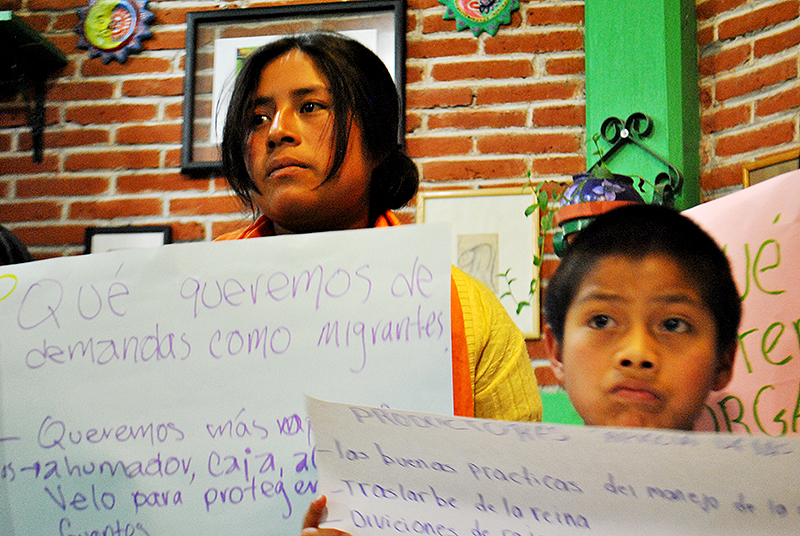SIPAZ: 20 years accompanying lights of hope
02/06/2015SIPAZ ACTIVITIES (From mid-February to mid-May 2015)
03/06/2015On the night of New Years Eve, the cold and rain had descended on the Caracol II of Oventik in the Chiapas highlands. During the conclusion of the “First World Festival of Resistance and Rebellion against Capitalism,” in the presence of the families of the forcibly disappeared 43 students from the Rural Normal School of Ayotzinapa, Guerrero, Subcomandante Insurgente Moisés shared these words:
“Critical thinking is necessary for the struggle.
Critical thinking they refer to as theory.
We say no to lazy thinking that conforms itself to whatever exists.
No to dogmatic thinking that tries to become Rule and impose itself
No to trickery that argues by using lies.
We say yes to the type of thinking that asks, that questions, that doubts.
Not even in the most difficult conditions should the study and analysis of reality be abandoned.
Study and analysis are also weapons of struggle.
But neither practice by itself, nor theory by itself is enough.
Thinking that does not struggle does nothing but make noise.
A struggle that does not think repeats its mistakes and does not get up after it falls.
Struggle and thinking unite in those who are warriors, in the rebellion and resistance that today shake the world, even if their sound is one of silence.”
Precisely seeking to unite critical thinking and struggle, from May 3 to 9, 2015, the Zapatista Army of National Liberation (EZLN) invited members of the National Indigenous Congress (CNI), adherents and non-adherents to the Sixth Declaration of the Lacandon Jungle, Mexicans, and foreigners to participate in the Seminar on “Critical Thought versus the Capitalist Hydra.” The title of the event, characterizing the present stage of capitalism, evokes the marine monster from Greek mythology, the hydra, which has numerous heads that are doubly reproduced with each one that is lost or cut off.
A day before the beginning of the event, an homage from the EZLN was presented at the caracol of Oventik dedicated to the philosopher Luis Villoro Toranzo, who died in March of 2014, and for José Luis Solís López (Galeano), who was murdered in May of 2014 in La Realidad, municipality of La Realidad. The event emphasized the necessity of keeping the struggles alive of the deceased comrades – through the organization and construction of alternatives to the capitalist system.
The Seminar was held at CIDECI-Unitierra in San Cristóbal de las Casas, Chiapas, with the participation of over 1,500 people from different parts of Chiapas and the world. They requested leave from their jobs, sold food in the streets to cover their travel expenses, and skipped classes at school to be present, challenged, and provoked by dozens of speakers. Amidst the diversity of voices and perspectives, many questions were covered, including the roots and characteristics of the capitalist hydra today, the political economy of communities, agroecology and transgenic crops on indigenous and campesino lands, feminism, and the way in which the Zapatistas are working toward autonomy. Academics, activists, and male and female commanders participated, with Subcomandante Moisés and Subcomandante Galeano (formerly Marcos) facilitating and closing the sessions.
The speakers at the seminar offered “seeds” so participants could choose the ones that serve them in their present context. These seeds serve not only for critical thinking but also struggle and resistance. It was a week full of an honest and difficult naming of the present reality. The Zapatistas expressed clearly that critical thought is the attempt to understand the Storm in which we find ourselves, because “it no longer is as it previously was.” The Zapatistas challenged the audience, holding, in the words of Subcomandante Moisés, that it is not the time merely to walk, but rather to “trot.” The Subcomandante asserted that it is not enough to respond to injustice with marches, actions on social media, protests, and so on, because these actions will not succeed in changing the present situation. From this point on, the Zapatistas stressed the importance of understanding how and in what way the capitalist hydra has changed, and of truly understanding the roots of the Storm.
It was stressed, nonetheless, that amidst this storm, hope lives on. To promote it, the Zapatistas emphasized the importance of the organization of the civil society. Within the present electoral context, Subcomandante Insurgente Moisés remarked: “whether you vote or not, organize yourself. And well, we Zapatistas think that we have to have good ideas in order to organize ourselves. Which is to say, we need theory, critical thought.” He closed the event by affirming that “Our tasks and obligations are great, such that the comrades will leave with much to think about and to imagine. Go and speak to the rest of your comrades wherever you live, because at other times and using different forms, we will have to find other ways of working together.”

